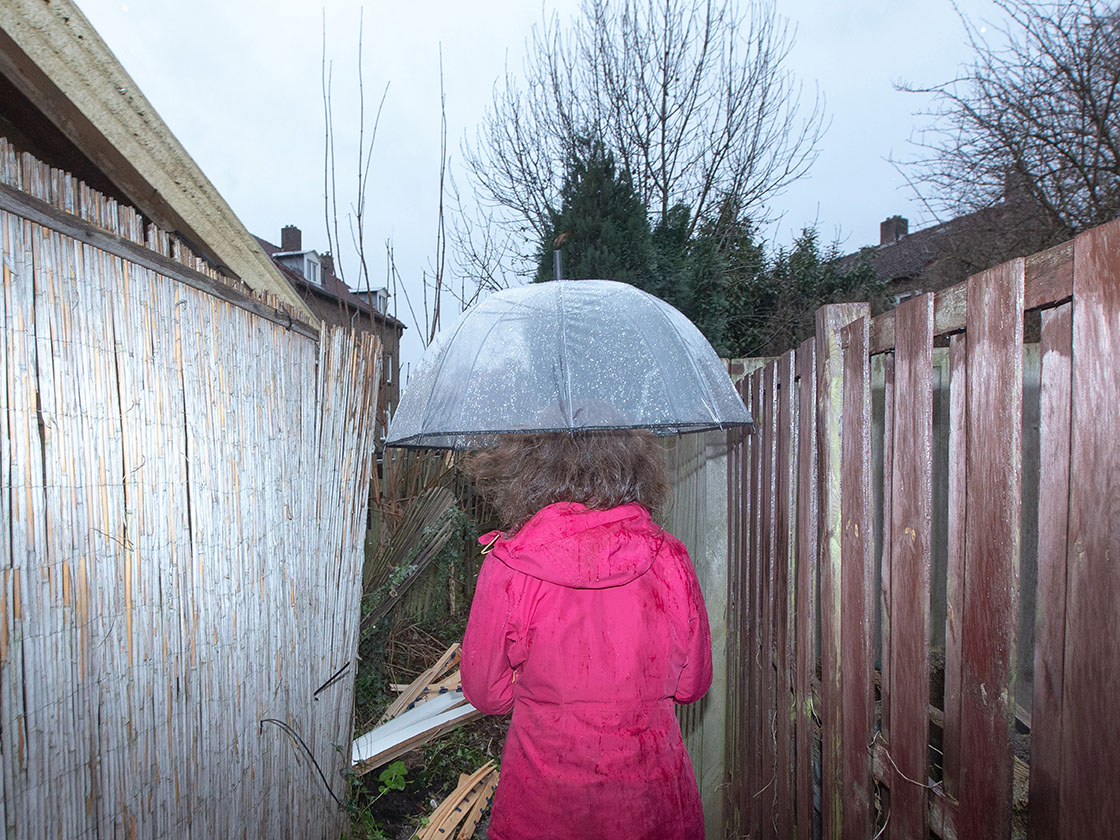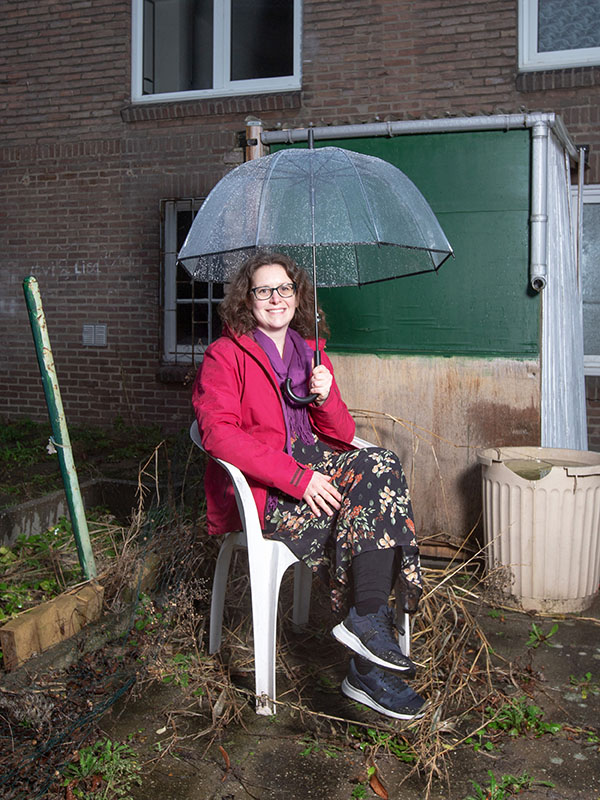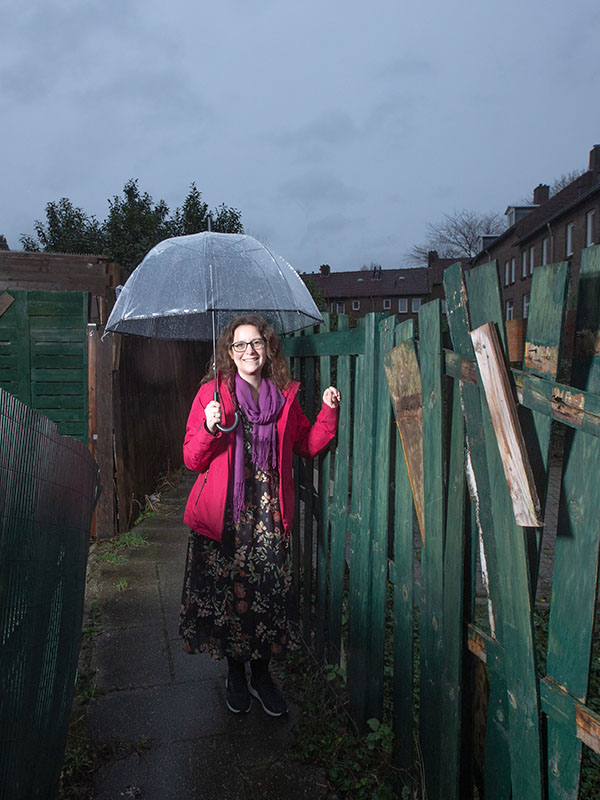“People just want to be treated like people”
Gera Nagelhout is, in many respects, not a typical professor. She was the first in her family to attend university, and at the age of 34 was appointed endowed professor of Health and Wellbeing of People with a Lower Socioeconomic Position. Working within the confines of the ivory tower is alien to her. “People often say this target group is hard to reach. That’s just not true.” She talks here about the impact of poverty on health.
Between the energy crisis and inflation, poverty is on the rise in the Netherlands. From her base at the Care and Public Health Research Institute (CAPHRI), Gera Nagelhout finds herself flooded with requests for interviews and invitations for lectures. While she enjoys talking to journalists, she also has mixed feelings about the sudden interest. “Poverty is hardly new. It's just that middle-class people who used to be relatively financially secure are now struggling too. We should have found poverty appalling even when it ‘only’ affected other groups.”
Unhealthy environment
Those other groups are the people at the centre of her research: people who, due to debts, poor literacy or low education levels, have wound up in a vulnerable position. This makes it harder for them to live a healthy life, Nagelhout explains. Chronic stress resulting from financial worries can lead to physical and psychological problems. Stress hampers your capacity to plan and prioritise, so you have difficulty making sensible, healthy choices. And people with a lower socioeconomic status often live in poorly insulated houses, with few parks or green spaces around but an overabundance of takeaway food. “Their ability to choose a healthy lifestyle is challenged from every direction,” Nagelhout says.


Gera Nagelhout studied Communication Science at Radboud University Nijmegen and the University of Twente. In 2012 she obtained her PhD cum laude at Maastricht University for her research into the impact of smoking bans on smokers. In 2019 she was appointed endowed professor of Health and Wellbeing of People with a Lower Socioeconomic Position at UM. She combines her professorship with the position of Chief Science Officer at the lifestyle and addiction research institute IVO.
Financial incentive
Yet, precisely those people who are already struggling can benefit most from a nudge in the right direction. Legislation to make healthy products cheaper and unhealthy products more expensive would help. So too would outright financial rewards for healthy choices. Nagelhout and her team found that the latter can be effective when it comes to quitting smoking. In their research, participants who managed to stop smoking with the help of counselling received a €350 reward after a year. “For people on a low income, that’s a lot of money. A reward like that works well with this group in particular.”
Nagelhout, who lost her own father to smoking, strives to ensure broad dissemination of her findings. “I’ve always wanted to do research that’s relevant to society, so it would be strange to then publish the results only in scientific journals. That’s why we write blogs and opinion pieces, make videos and are active on social media. We find it important to communicate what we’ve learnt to our target group in understandable language—something that doesn’t always happen.”
"Poverty is hardly new. It's just that middle-class people who used to be relatively financially secure are now struggling too. We should have found poverty appalling even when it ‘only’ affected other groups."

Reaching the target group
She also points out a more fundamental problem: academics involved in health promotion rarely involve people of lower socioeconomic status in their research. Nagelhout regularly sees PhD research, for example, that fails to include people with lower education levels. “That just shouldn’t be allowed. It’s often said that this target group is hard to reach, but they’re just people you can talk to.” Her message to fellow researchers: get out from behind your desk to recruit participants actively and in person.
Nagelhout herself works with an advisory group of Maastricht residents with lower incomes. “It’s a way to get feedback at every stage of the research process from the people our results are most relevant to,” she says. “And they in turn seem to enjoy being able to share their experiences with one another.” What has she herself learnt from these encounters? “People just want to be treated like people, free of judgement about how they live or ended up in a certain situation. Only if we help make their circumstances less precarious will they be able to take steps towards a healthier life.”
Impact
More than three years after her appointment as professor—“it happened quickly and took some getting used to”—Nagelhout now feels at home in her role. She attributes her lightning-fast rise to a combination of hard work, talent and luck. “I never aspired to become a professor; I just didn’t have the role models. But when I was asked, I realised I was actually already doing it; supervising PhD candidates, talking about our research during lectures or in the media, writing grant applications. It’s nice to be able to do what you find important.”
She and her team regularly carry out research commissioned by municipalities and ministries, where their findings are immediately applied in practice. “Which is not to say I control the political decision making,” she adds. “Both the money problems and the health problems these people face are intergenerational; they’re passed down from parent to child. It’s actually a relatively small group that needs very targeted help. And providing it could ultimately save us a great deal of money. In that sense, the fact that poverty still exists in the Netherlands is a choice.”
Jolien Linssen (text)
"It’s actually a relatively small group that needs very targeted help. And providing it could ultimately save us a great deal of money. In that sense, the fact that poverty still exists in the Netherlands is a choice. "
- in Corporate
- in Featured
- in Human interest
- in Researchers